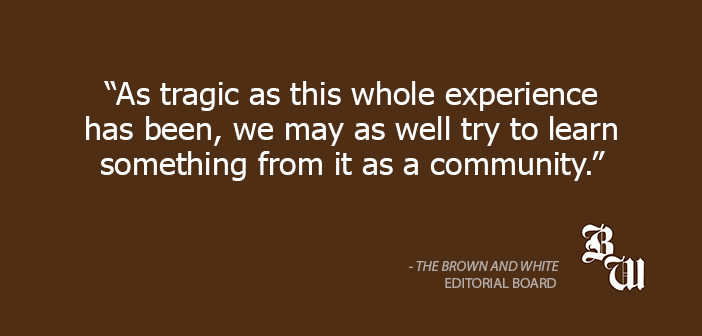“Flattening the curve” is a phrase health officials may use frequently, but a term many Americans recently heard for the first time over the last few months. A lower and flatter curve is what countries across the world have been targeting.
However, it hasn’t just been the job of health officials to flatten the curve. Each member of society plays a pivotal role in taking steps to slow the spread of the virus, both with cleanliness and with social interactions.
On a daily basis, we hear on the news health experts aggressively encouraging social distancing, especially until a vaccine is developed. So far, it has been a journey and a sacrifice for millions of Americans whose lives were either disrupted or directly impacted by the virus.
An endless amount of courage and persistence has been displayed by our society to fight this battle, and our reaction to this virus has been remarkable.
As most of us remain at home, we can only continue to hope that life goes back to pre-coronavirus normalcy as soon as possible.
But what is “normal” anymore? Is there going to be a new “normal” once this is all over? With regards to cleanliness and health, we may see two outcomes occur when we are allowed to return to normalcy.
The first outcome is that everyone will be so excited to get back to their lives that caution will be thrown to the wind, and everyone will be rushing to meet in large gatherings.
The alternative and probably safer outcome, though, is that everyone returns cautiously to their everyday lives and takes things slowly. After all of the work we have put in for months to slow down the spread of the virus, the last thing we want is to get impatient and ruin the progress we have made. It will have to be a gradual process if we don’t want to repeat our mistakes.
It is disheartening to see people disrespect the idea of social distancing, rushing to get back to normalcy and declaring victory over the virus before it is appropriate to do so.
It is also possible that returning back to “normal” might be a different outlook than it was in March. This applies to not just cleanliness, but also when it comes to social interactions.
In a strange way, before this pandemic occurred, we were, at times, already quite socially distant and spending a lot of time on our screens instead of with each other. This pandemic has only brought about the extreme version of this, where we are all physically separated, as well.
Perhaps something we can take from this is that, when we do return to “normalcy,” we will all be a lot more grateful for the time we spend in person with each other. We won’t be as quick to go on our phones during a meal or a small-scale social gathering, and we will have a new outlook on time spent together.
As tragic as this whole experience has been, we may as well try to learn something from it as a community.
It feels like every Lehigh student is so eager to get back to normal life, but perhaps there will be a “new normal.” This might make some people upset, and that is completely understandable considering the difficult times we are living in.
Maybe a “new normal” is exactly what we need. Maybe, when this is all over, we can reset as a community and return stronger.
We have learned a whole new way of living, both in terms of being careful with hygiene and not taking in-person social interactions for granted. These are challenging times for everyone, and it is important we shed light on what we are learning in order to come out of this stronger than when it all began.
There is no doubt that we will emerge from the coronavirus era with a newfound sense of outlook on our lives.
But as hopeful signs of the virus’ spread begin to show up in social media or mathematical models, we must be wary of how we, as society, want to attack this “new normal.”
We have to be extremely careful not to rush the process, and we also have to be open-minded about what a new, post-virus life could look like.






Comment policy
Comments posted to The Brown and White website are reviewed by a moderator before being approved. Incendiary speech or harassing language, including comments targeted at individuals, may be deemed unacceptable and not published. Spam and other soliciting will also be declined.
The Brown and White also reserves the right to not publish entirely anonymous comments.
1 Comment
According to experts in Sociology from Airlangga University the application of New Normal can be the cause of social conflict. This is because the current pandemic conditions exert a socio-economic influence that is so large that various parties must adapt, check this out news.unair.ac.id/2020/06/13/new-normal-pakar-sosiologi-unair-konflik-sosial-berpotensi-terjadi-di-seluruh-kalangan-masyarakat/